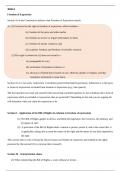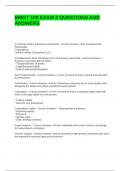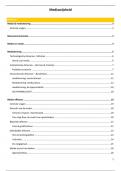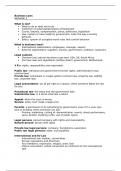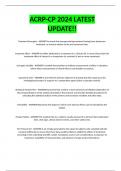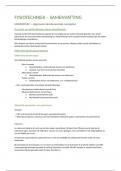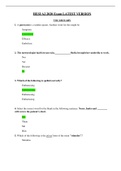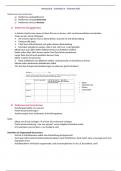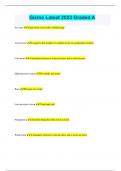Freedom of Expression
Section 16 of the Constitution outlines what Freedom of Expression entails:
16. (1) Everyone has the right to freedom of expression, which includes—
(a) freedom of the press and other media;
(b) freedom to receive or impart information or ideas;
(c) freedom of artistic creativity; and
(d) academic freedom and freedom of scientific research.
(2) The right in subsection (1) does not extend to—
(a) propaganda for war;
(b) incitement of imminent violence; or
(c) advocacy of hatred that is based on race, ethnicity, gender or religion, and that
constitutes incitement to cause harm.
Section 16 is in two parts. Subsection 1 constitutes protected/included expressions. Subsection 2 is the types
or forms of expressions excluded from freedom of expression (e.g., hate speech).
The first question you must ask yourself when answering a problem question is: Am I dealing with a form of
expression which is excluded or expressions that are protected?! Depending on the side you are arguing for
will determine what you claim the expression to be.
Section 8 – Application of the Bill of Rights (in relation to freedom of expression)
(1) The Bill of Rights applies to all law, and binds the legislature, the executive, the judiciary and
all organs of state
(2) A provision of the Bill of Rights binds a natural or juristic person if, and to the extent that, it
is applicable, taking into account the nature of the right and the nature of any duty imposed by
the right
This section tells us who is bound by the provisions on freedom of expression and entitled to the rights
protected by this section! (It is everyone that is bound!)
Section 39 – Interpretation clause
(1) When interpreting the Bill of Rights, a court, tribunal or forum –
, (a) Must promote the values that underlie an open and democratic society based on
human dignity, equality and freedom;
(b) Must consider international law; and
(c) May consider foreign law
Section 39 tells us how we interpret section 16 in order to determine if there are violations of freedom of
expression. Human dignity as a value, for example, influences how we interpret the scope and content of
freedom of expression
Founding Provision – Section 1
The Republic of South Africa is one, sovereign, democratic state founded on the following values:
(a) Human dignity, the achievement of equality and the advancement of human rights and freedoms
(b) Non-racialism and non-sexism
(c) Supremacy of the constitution and the rule of law
(d) Universal adult suffrage, a national common voters role, regular elections and a multi-party system
of democratic government, to ensure accountability, responsiveness and openness.
S 1 deals with human dignity as a VALUE.
Section 10 – human dignity
Everyone has inherent dignity and the right ot have their dignity respected and protected.
(Human dignity as a RIGHT. Can find conflicts between freedom of expression and dignity in many cases.)
Section 9 – Equality
(1) Everyone is equal before the law and has the right to equal protection and benefit of the law.
(2) Equality includes the full and equal enjoyment of all rights and freedoms. To promote the achievement of
equality, legislative and other measures designed to protect or advance persons, or categories of persons,
disadvantaged by unfair discrimination may be taken.
(3) The state may not unfairly discriminate directly or indirectly against anyone on one or more grounds,
including race, gender, sex, pregnancy, marital status, ethnic or social origin, colour, sexual orientation, age,
disability, religion, conscience, belief, culture, language and birth.
,(4) No person may unfairly discriminate directly or indirectly against anyone on one or more grounds in
terms of subsection (3). National legislation must be enacted to prevent or prohibit unfair discrimination.
(5) Discrimination on one or more of the grounds listed in subsection (3) is unfair unless it is established that
the discrimination is fair
Some forms of expression could amount to unfair discrimination according to s 9(3) and 9(4) and this is why
we must consider the interaction between freedom of expression and equality – some forms of expression
unfairly infringe on peoples’ right to equality.
Limitation clause – s 36
(1) The rights in the Bill of Rights may be limited only in terms of law of general application to the extent
that the limitation is reasonable and justifiable in an open and democratic society based on human dignity,
equality and freedom, taking into account all relevant factors, including—
(a) the nature of the right;
(b) the importance of the purpose of the limitation;
(c) the nature and extent of the limitation;
(d) the relation between the limitation and its purpose; and
(e) less restrictive means to achieve the purpose.
(2) Except as provided in subsection (1) or in any other provision of the Constitution, no law may limit any
right entrenched in the Bill of Rights.
At what point do you apply s 36 when dealing with freedom of expression? It is not always applicable on
certain facts. We will discuss this later.
Legislative Framework
S 10 of PEPUDA is the main provision that is used when considering freedom of expression.
It is important that you don’t forget that according to the Qwelane case, the word ‘harmful’ was removed
and is thus no longer a consideration under s 10.
S 10 Prohibition of Hate Speech Original Version:
(1) Subject to the proviso in section 12, no person may publish, propagate, advocate or communicate
words based on one or more of the prohibited grounds, against any person, that could reasonably
demonstrate a clear intention to –
, (a) Be hurtful
(b) Be harmful or incite harm
(c) Promote or propagate hatred
Post Qwelane:
Subject to the proviso in section 12, no person may publish, propagate, advocate or communicate words that
are based one or more of the prohibited grounds, against any person, that could reasonably be construed to
demonstrate a clear intention to be harmful or incite harm and to promote or propagate hatred.
Case Law
Islamic Unity Convention v Independent Broadcasting Authority 2002 (4) SA 294 (CC) para 1-5/21-51
- Challenge against the constitutionality of a regulation which prohibited the broadcasting of material
that is ‘likely to prejudice relations between sections of the population’
Afriform v Malema 2011 (12) BCLR 1289 (EqC)
- Challenge against the singing of the song ‘Dubula Ibhunu’ on grounds that it constitutes hate speech
Nelson Mandela Foundation Trust v Afriform NPC 2019
- Challenge against the display of the old flage (Apartheid) on grounds that it constitutes hate speech
Qwelane v SAHRC 2021
- Constitutional challenge against s 10 of the Equality Act
Afriform v EFF 2022
- Complaint against the songs ‘Kill/kiss the boer’ and ‘Call the fire brigade’. Court dismissed the
application holding that the requirements for an objective test had not been met.
NB.) The two Afriform cases were decided under different legislative frameworks! The 2011 judgment used
PEPUDA s 10 where ‘harmful’ was still a consideration and the 2021 case used the amended PEPUDA s 10
where harmful is no longer a consideration! This is important to remember as the legislative framework the
cases were decided under does directly impact the outcome.
Also remember that Freedom of expression is not just limited to speech! Can be about what you
wear, how to act etc.
The class had a discussion about why it is important to have freedom of expression protected – the
main points that arose were: it is central to us as human beings to be able to express ourselves; in our
country we have a history of censorship and so the right to express yourself without being
imprisoned for going against a set system is important; freedom to express yourself is a cornerstone
of liberal democracy.

